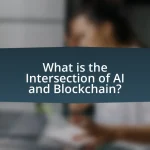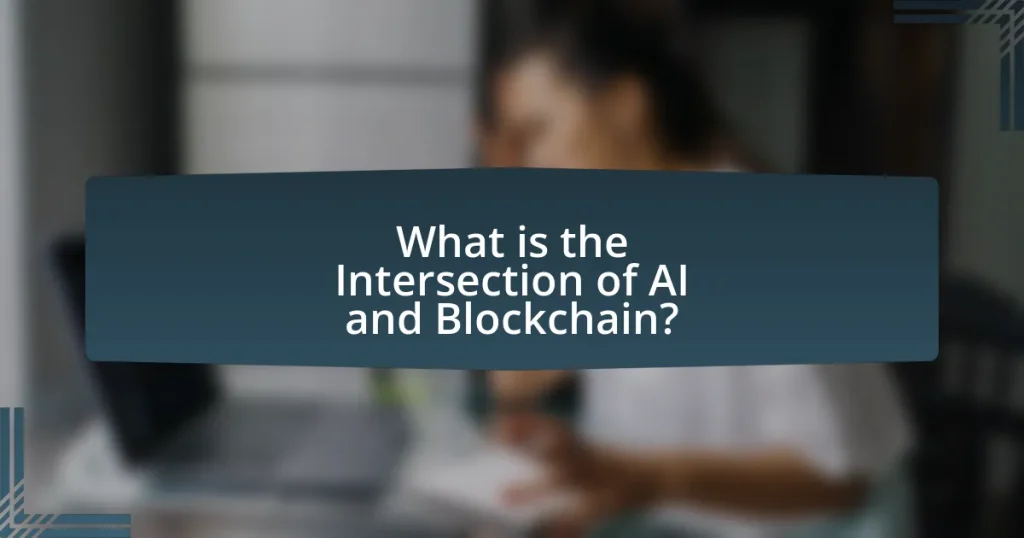The article explores the intersection of artificial intelligence (AI) and blockchain technology, highlighting how their integration enhances data security, transparency, and operational efficiency across various industries. Key features of AI, such as advanced data analysis and automation of smart contracts, complement blockchain’s secure and immutable ledger, leading to innovative applications in finance, supply chain management, healthcare, and real estate. The article also addresses potential challenges, including scalability, data privacy, and ethical considerations, while outlining best practices for successful implementation of AI and blockchain solutions. Overall, it emphasizes the transformative potential of combining these technologies for future innovations.

What is the Intersection of AI and Blockchain?
The intersection of AI and blockchain refers to the integration of artificial intelligence technologies with blockchain systems to enhance data security, transparency, and efficiency. AI can analyze vast amounts of data stored on blockchain networks, enabling smarter decision-making and predictive analytics. Conversely, blockchain can provide a secure and immutable ledger for AI algorithms, ensuring data integrity and trustworthiness. This synergy is evident in applications such as decentralized AI marketplaces, where AI models can be bought and sold securely, and in supply chain management, where AI optimizes logistics while blockchain tracks provenance.
How do AI and Blockchain complement each other?
AI and Blockchain complement each other by enhancing data security and improving decision-making processes. AI algorithms can analyze vast amounts of data stored on blockchain networks, providing insights that can lead to more informed decisions. Conversely, blockchain technology ensures the integrity and transparency of the data used by AI, reducing the risk of manipulation and increasing trust in AI-generated outcomes. For instance, a study by Accenture found that combining AI with blockchain can improve the efficiency of supply chain management by providing real-time data visibility and predictive analytics, demonstrating the synergistic benefits of these technologies.
What are the key features of AI that enhance Blockchain technology?
Key features of AI that enhance Blockchain technology include improved data analysis, enhanced security, and automation of smart contracts. AI algorithms can analyze vast amounts of blockchain data to identify patterns and anomalies, which aids in fraud detection and enhances decision-making processes. Additionally, AI can bolster security by predicting and mitigating potential threats through machine learning techniques. Furthermore, AI facilitates the automation of smart contracts, ensuring they execute automatically when predefined conditions are met, thus increasing efficiency and reducing human error. These features collectively contribute to a more robust and efficient blockchain ecosystem.
How does Blockchain improve the functionality of AI systems?
Blockchain enhances the functionality of AI systems by providing secure, transparent, and decentralized data management. This technology allows AI algorithms to access and share data across multiple nodes without the risk of tampering, ensuring data integrity. For instance, a study published in the journal “Artificial Intelligence Review” highlights that integrating blockchain with AI can improve data provenance, which is crucial for training reliable AI models. Additionally, blockchain facilitates the creation of decentralized AI marketplaces, enabling developers to monetize their algorithms while maintaining control over their intellectual property. This combination of security and accessibility ultimately leads to more robust and trustworthy AI applications.
What are the potential applications of AI and Blockchain integration?
The potential applications of AI and Blockchain integration include enhanced data security, improved supply chain management, and automated smart contracts. AI can analyze vast amounts of data stored on blockchain networks, providing insights that enhance decision-making processes. For instance, in supply chain management, AI algorithms can predict demand and optimize inventory levels while blockchain ensures transparency and traceability of goods. Additionally, smart contracts can be automated using AI, allowing for self-executing agreements that reduce the need for intermediaries and increase efficiency. These applications demonstrate how the combination of AI and Blockchain can lead to innovative solutions across various industries.
Which industries are most likely to benefit from this integration?
The industries most likely to benefit from the integration of AI and blockchain include finance, supply chain management, healthcare, and real estate. In finance, AI can enhance fraud detection while blockchain ensures secure transactions. Supply chain management benefits from AI’s predictive analytics and blockchain’s transparency, improving efficiency and traceability. In healthcare, AI can analyze patient data for better outcomes, while blockchain secures sensitive information and streamlines record-keeping. Real estate can leverage AI for property valuation and blockchain for secure, transparent transactions. These integrations enhance operational efficiency, security, and data integrity across these sectors.
How can AI and Blockchain transform supply chain management?
AI and Blockchain can transform supply chain management by enhancing transparency, efficiency, and traceability. AI algorithms analyze vast amounts of data to optimize logistics, predict demand, and improve inventory management, while Blockchain provides a secure, immutable ledger that records every transaction and movement of goods. This combination allows for real-time tracking of products, reducing fraud and errors, and ensuring compliance with regulations. For instance, a study by Accenture found that integrating AI and Blockchain could reduce supply chain costs by up to 30% and improve delivery times by 50%.

What Innovations are Emerging from AI and Blockchain Collaboration?
Innovations emerging from AI and blockchain collaboration include enhanced data security, improved supply chain transparency, and automated smart contracts. The integration of AI algorithms with blockchain technology allows for real-time data analysis while ensuring data integrity through decentralized ledgers. For instance, companies like VeChain utilize AI to analyze supply chain data stored on blockchain, enabling better decision-making and fraud detection. Additionally, AI-driven predictive analytics can optimize smart contracts by automating execution based on predefined conditions, as seen in platforms like Chainlink. These innovations demonstrate the potential for increased efficiency and trust in various industries, including finance, healthcare, and logistics.
How are smart contracts evolving with AI integration?
Smart contracts are evolving with AI integration by enhancing their functionality, efficiency, and adaptability. AI algorithms enable smart contracts to analyze data in real-time, allowing for automated decision-making based on predefined conditions. For instance, AI can optimize contract execution by predicting outcomes and adjusting terms dynamically, which improves transaction accuracy and reduces the need for intermediaries. This evolution is supported by advancements in machine learning and natural language processing, which facilitate better interpretation of contract language and intent, ultimately leading to more intelligent and responsive smart contracts.
What role does AI play in automating smart contract execution?
AI plays a crucial role in automating smart contract execution by enhancing decision-making processes and improving efficiency. Through machine learning algorithms, AI can analyze vast amounts of data to trigger contract conditions automatically, ensuring that contracts execute only when predefined criteria are met. For instance, AI can monitor real-time data feeds, such as market prices or user actions, and initiate contract execution without human intervention. This capability reduces the risk of errors and increases the speed of transactions, as evidenced by projects like Chainlink, which integrates AI with blockchain to provide reliable data inputs for smart contracts.
How can AI enhance the security of smart contracts?
AI can enhance the security of smart contracts by utilizing machine learning algorithms to identify vulnerabilities and predict potential attacks. These algorithms analyze historical data and patterns in smart contract execution, enabling the detection of anomalies that may indicate security risks. For instance, AI can automate the auditing process, significantly reducing human error and increasing the efficiency of identifying flaws in code. Research has shown that AI-driven tools can improve the accuracy of vulnerability detection by up to 90%, thereby reinforcing the overall security framework of smart contracts.
What advancements in data management are driven by AI and Blockchain?
Advancements in data management driven by AI and Blockchain include enhanced data security, improved data integrity, and automated data processing. AI algorithms analyze vast datasets to identify patterns and anomalies, while Blockchain technology ensures that data is immutable and transparent. For instance, the integration of AI with Blockchain allows for real-time data verification, reducing the risk of fraud and errors. According to a report by Deloitte, organizations leveraging AI and Blockchain together can achieve up to 30% cost savings in data management processes. This synergy not only streamlines operations but also fosters trust among stakeholders by providing a secure and verifiable data environment.
How does AI improve data analytics in Blockchain systems?
AI enhances data analytics in blockchain systems by enabling advanced pattern recognition and predictive analytics. Through machine learning algorithms, AI can analyze vast amounts of blockchain data to identify trends, anomalies, and correlations that would be difficult for humans to detect. For instance, AI can process transaction data in real-time, providing insights into user behavior and potential fraud, thereby improving security and operational efficiency. Additionally, AI-driven analytics can optimize smart contract performance by predicting outcomes based on historical data, leading to more informed decision-making. This integration of AI into blockchain analytics not only increases the accuracy of data interpretation but also accelerates the speed at which insights can be generated, ultimately driving innovation in various sectors that utilize blockchain technology.
What are the implications of decentralized data storage with AI?
Decentralized data storage with AI enhances data security, privacy, and accessibility. By distributing data across multiple nodes, it reduces the risk of data breaches and unauthorized access, as no single entity controls the entire dataset. Furthermore, AI algorithms can analyze decentralized data more efficiently, leading to improved decision-making and insights. For instance, a study by the Massachusetts Institute of Technology found that decentralized storage systems can increase data integrity and reduce latency in data retrieval, demonstrating the effectiveness of this approach in real-world applications.

What Challenges Exist at the Intersection of AI and Blockchain?
The challenges at the intersection of AI and blockchain include scalability, data privacy, and integration complexity. Scalability issues arise because blockchain networks often struggle to handle the high transaction volumes generated by AI applications, leading to slower processing times. Data privacy concerns are significant since AI systems require large datasets for training, which may conflict with blockchain’s transparency and immutability principles. Integration complexity is another challenge, as combining AI algorithms with blockchain technology necessitates specialized knowledge and can result in interoperability issues between different systems. These challenges highlight the need for innovative solutions to effectively leverage the strengths of both technologies.
What are the ethical considerations of combining AI and Blockchain?
The ethical considerations of combining AI and Blockchain include issues of privacy, accountability, and bias. Privacy concerns arise because AI systems often require large datasets, which may include sensitive personal information, while Blockchain’s transparency can conflict with the need for confidentiality. Accountability is critical, as the integration of AI can complicate the attribution of responsibility for decisions made by autonomous systems, especially when those decisions are recorded on an immutable Blockchain. Additionally, bias in AI algorithms can perpetuate inequalities, and if such biased decisions are recorded on Blockchain, they could become permanent and unchangeable, exacerbating social injustices. These considerations highlight the need for robust ethical frameworks to guide the development and deployment of AI and Blockchain technologies.
How can bias in AI algorithms affect Blockchain outcomes?
Bias in AI algorithms can lead to skewed data inputs, which negatively impact blockchain outcomes by compromising the integrity and fairness of the decentralized system. When AI algorithms are trained on biased datasets, they may produce outputs that favor certain groups or perspectives, resulting in unequal access or treatment within blockchain applications. For instance, if an AI model used for credit scoring in a blockchain-based lending platform is biased against specific demographics, it could lead to unfair lending practices, ultimately undermining the trust and transparency that blockchain aims to provide. This relationship highlights the critical need for unbiased AI to ensure equitable blockchain solutions.
What measures can be taken to ensure transparency in AI and Blockchain applications?
To ensure transparency in AI and Blockchain applications, implementing clear governance frameworks is essential. These frameworks should define roles, responsibilities, and processes for decision-making, thereby fostering accountability. Additionally, utilizing open-source algorithms in AI can enhance transparency by allowing external scrutiny and validation of the models used. In Blockchain, employing public ledgers ensures that all transactions are visible and verifiable by all participants, which inherently promotes trust. Furthermore, regular audits and compliance checks can help maintain transparency by ensuring adherence to established standards and regulations. These measures collectively contribute to a more transparent environment in both AI and Blockchain applications.
What technical challenges must be addressed for successful integration?
Successful integration of AI and blockchain requires addressing several technical challenges, including interoperability, data privacy, and scalability. Interoperability is crucial as different blockchain platforms and AI systems must communicate effectively; for instance, the lack of standardized protocols can hinder seamless data exchange. Data privacy poses a challenge because AI often requires access to large datasets, which may conflict with blockchain’s transparency principles; ensuring that sensitive information remains secure while still being usable for AI algorithms is essential. Scalability is another significant issue, as both AI and blockchain technologies can face performance bottlenecks when processing large volumes of data; for example, Ethereum’s transaction speed limitations can impede real-time AI applications. Addressing these challenges is vital for harnessing the full potential of AI and blockchain in innovative applications.
How do scalability issues impact AI and Blockchain collaboration?
Scalability issues significantly hinder the collaboration between AI and Blockchain by limiting the speed and efficiency of data processing. Blockchain networks often face challenges in handling large volumes of transactions quickly, which can delay the real-time data analysis that AI systems require. For instance, Bitcoin’s blockchain can process only about seven transactions per second, whereas AI applications may need to analyze thousands of data points in real-time for effective decision-making. This mismatch in processing capabilities can lead to bottlenecks, reducing the overall effectiveness of integrated solutions that rely on both technologies.
What are the interoperability challenges between AI systems and Blockchain networks?
Interoperability challenges between AI systems and Blockchain networks primarily stem from differences in data formats, protocols, and governance structures. AI systems often require structured data for training and inference, while Blockchain networks utilize decentralized, often unstructured data formats that can complicate data integration. Additionally, the consensus mechanisms in Blockchain can introduce latency, which conflicts with the real-time processing needs of AI applications. Furthermore, varying standards and protocols across different Blockchain platforms hinder seamless communication and data exchange, making it difficult for AI systems to leverage Blockchain’s capabilities effectively. These challenges necessitate the development of standardized interfaces and protocols to facilitate better integration between the two technologies.
What Best Practices Should Be Followed When Implementing AI and Blockchain Solutions?
When implementing AI and blockchain solutions, organizations should prioritize interoperability, data privacy, and ethical considerations. Interoperability ensures that AI systems can effectively communicate with blockchain networks, facilitating seamless data exchange and enhancing functionality. Data privacy is critical, as both AI and blockchain handle sensitive information; implementing robust encryption and access controls protects user data. Ethical considerations involve transparency in AI algorithms and blockchain transactions, fostering trust among users and stakeholders. These best practices are supported by industry standards and frameworks, such as the IEEE’s guidelines on AI ethics and the General Data Protection Regulation (GDPR) for data privacy, which emphasize the importance of responsible technology deployment.
How can organizations ensure successful integration of AI and Blockchain technologies?
Organizations can ensure successful integration of AI and Blockchain technologies by establishing a clear strategy that aligns both technologies with their business objectives. This involves identifying specific use cases where AI can enhance blockchain applications, such as improving data analysis and decision-making processes, while blockchain can provide secure and transparent data management for AI models.
For instance, a study by Accenture highlights that organizations leveraging AI and blockchain together can achieve up to 30% cost savings and improved operational efficiency. Additionally, fostering collaboration between cross-functional teams, including data scientists and blockchain developers, is crucial for addressing technical challenges and ensuring seamless interoperability between the two technologies.
What strategies can be employed to mitigate risks associated with AI and Blockchain projects?
To mitigate risks associated with AI and Blockchain projects, organizations can implement comprehensive risk assessment frameworks, establish robust governance structures, and ensure continuous monitoring and compliance. Risk assessment frameworks help identify potential vulnerabilities in both technologies, allowing for proactive measures to be taken. Robust governance structures, including clear policies and accountability mechanisms, ensure that ethical considerations and regulatory requirements are met, reducing the likelihood of legal and reputational risks. Continuous monitoring and compliance checks enable organizations to adapt to evolving threats and maintain system integrity, as evidenced by the increasing number of regulatory guidelines being established globally for AI and Blockchain technologies.










